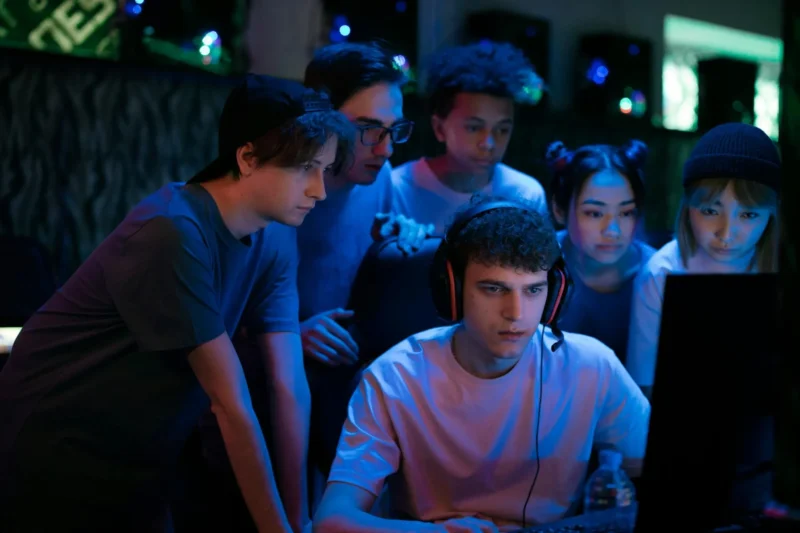
Berlin is a city where the night never ends, and the beat never stops. For electronic music fans, few places hold as much allure and historical significance as Germany’s capital.
From the gritty basslines echoing off the remnants of the Berlin Wall to today’s sleek digital productions, the city’s music scene is as dynamic as its history. From melodic techno acts like Anyma to acid techno producers like Charlotte de Witte, plenty of today’s biggest names have taken inspiration from DJs who called Berlin home.
Today, let’s get a taste of why Berlin remains at the forefront of the electronic music world.
Why Does Berlin Have Such a Historic Electronic Music Scene?
Berlin’s electronic music scene didn’t just appear out of thin air; it rose from the ashes of a city divided. Post-World War II, Berlin was a city literally split in two, creating distinct cultural dynamics that would later fuel its creative rebellion. When the Berlin Wall fell in 1989, it unleashed pent-up creative and cultural energies that had been simmering for decades.
In the 1990s, Berlin transformed. Empty warehouses, abandoned buildings, and even decommissioned power plants became the playgrounds for the first generation of electronic music aficionados. Clubs like Tresor and E-Werk began popping up, becoming ground zero for the techno music explosion.
These spots were sanctuaries of sound where the youth from both sides of the former divide could unite under the bright lights and relentless beats. It was here that Berlin began to stake its claim as a global epicenter of electronic music, a place where artists could experiment away from the stringent commercial pressures found elsewhere.
A New Wave of Berlin Artists
A bold new crop of artists sculpting the future of Berlin’s electronic soundscape. Figures like Nina Kraviz, Ben Klock, Ellen Allien, and Marcel Dettmann continue pushing the boundaries of techno to new heights.

Many of these artists have been given a coveted residency at Berghain, while others have founded labels such as Bpitch Control or Innervisions to nurture the next fresh generation of emerging artists.
EDM performances in Berlin, particularly at venues like Berghain, showcase the symbiotic relationship between the city and its artists. These shows are more than concerts; they are immersive experiences that reflect the city’s rich, tumultuous history and its continuous push toward the future.
Berlin’s Influence on Electronic Music Technology and Innovation
Berlin is a pioneer at the cutting edge of electronic music technology — it’s the Silicon Valley for synth nerds and software samplers. From the grungy basements of Kreuzberg to the high-tech studios in Mitte, innovation is as ubiquitous as the 4/4 beat pumping from the city’s numerous clubs. This is where history-rich analog tech meets the limitless possibilities of digital, creating sounds that resonate on dance floors worldwide.
Local tech start-ups often collaborate with artists, turning knob-twisting DJs and producers into de facto beta testers for the next big thing in music tech. This innovative spirit attracts creators from all over the globe and keeps them there, hooked on the city’s avant-garde approach to sound and its creation.
The Role of Berlin’s Nightlife and Club Culture
If Berlin’s heart beats to electronic music, its pulse is most vigorous in the city’s clubs. These clubs are hallowed halls for the kind of sonic experimentation that has influenced countless genres and artists worldwide.
These are places where door policies are notoriously strict, not to maintain exclusivity but to preserve a vibe where everyone from the techno tourist to the local aficionado can lose themselves in the music.

This culture has fostered a unique blend of sincerity and celebration, turning Berlin into a beacon for those who seek to experience the zenith of electronic music in its most authentic form.
Festivals and Events That Celebrate Electronic Music in Berlin
Alongside its clubs, Berlin’s electronic music festivals act as a magnet for fans and artists alike. Events like the Love Parade, which began in 1989, have written themselves into the annals of music history for their scale and spirit of communal joy and political expression.
Although the original Love Parade has since ended, its ethos lives on in newer events like Berlin Atonal, which showcases experimental and avant-garde electronic music in an old power plant — more proof of the city’s knack for reinvention.
A City Tuned to the Future
In Berlin, the spirit of innovation pulses through cobbled streets and culminates at the DJ booths of packed clubs. This city, steeped in history, has managed to turn its past divides into the driving beats of techno, house, and everything in between. Berlin’s global influence on the electronic music scene is undeniable. From the technology that powers the music to the clubs and festivals that celebrate it, Berlin offers a resonant blend of history, culture, and innovation that continues to attract, inspire, and evolve.












